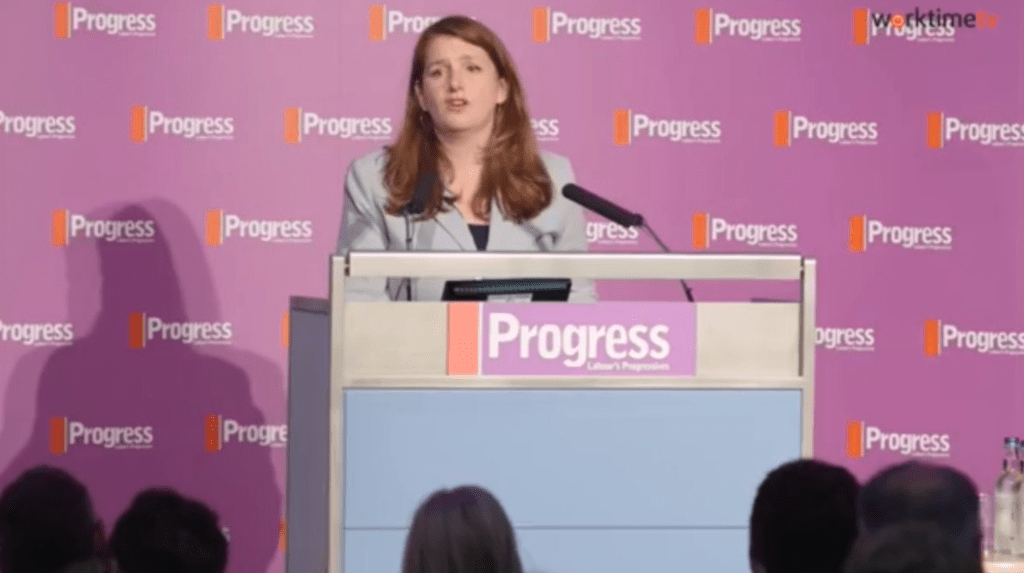There is one promise Keir Starmer made that no-one can accuse him of breaking. He said he would not be speaking to large rallies, and in his on-line address to the relaunch of Labour’s right-wing Progress organisation, he certainly didn’t do that. In fact, he spoke to only 56 people, and a couple of them nosey left-wingers.
By the time Peter Mandelson was due to speak to the meeting, this ‘mass’ audience had shrunk to 28, smaller than most Left Horizons Zoom meetings, and only 23 wanted to listen to the darling of the Labour right, ex-MP, David Miliband.
The new organisation the right has cobbled together – and it is an organisation – is called ‘Progressive Britain’, with the emphasis, as the logo above shows, on ‘Britain’. But it is really Progress re-named, having absorbed a smaller think-tank called the Policy Network. Applying to join Progressive Britain on its website shows clearly that the overarching organisation is still based on Progress Ltd, which has been registered at Companies House for years.
Labour’s rules apply differently to the right and the left
As if we didn’t already know it, this organisation is proof, yet again, that the rules of the Labour Party are applied differently as regards the left and right wings of the party. In the 1980s, supporters of the paper Militant were expelled from the Party on the supposed grounds that it constituted a ‘party within a party’. Similar expulsions go on today.
Yet in an article on Progressive Britain the Guardian (May 16), quoted MP Wes Streeting in these terms: “the move to set up a new membership organisation was aimed at rescuing the party from crisis.” So here is a right-wing organisation, with its own members, subscriptions, full-time organisers, publications and conferences…and the Labour Party hierarchy doesn’t bat an eyelid. Not only that, but they participate in its meetings.

The real crime of Militant all those years ago wasn’t being a ‘party within a party’; it was being successful. That is certainly not an accusation that can be levelled at Labour’s various right-wing organisations today, or any time. In fact, they are constantly having to rebrand and re-invent themselves to appear to be ‘new’ and ‘modern’. In reality, all they are offering is the same old Blairism.
Labour right-wingers today would have opposed Labour in 1945
Their political traditions, of course, go further back, except that in an earlier period these same people, or their equivalent, would have been outside the Labour Party, perhaps as Liberals or Conservatives. They would have opposed the radical agenda of 1945 that nationalised large sections of industry and established the NHS, as vehemently as they opposed Jeremy Corbyn and the Labour manifestos of 2017 and 2019.
Reading the articles and blogs on the Progressive Britain website, you could log a considerable number of references to ‘poverty’, ‘black lives matter’, ‘fairness’ and even ‘climate change’. All the right buzz words are there. But what you will not find are any concrete expressions of policy or programme remotely resembling the content of the past two Labour election manifestos.
Does Progressive Britain support NHS pay rise? Pass
We see the same feature in Wes Streeting’s comments to the Guardian article mentioned. Referring to the Progress relaunch, he says, “Labour has no future if the debate about our direction becomes locked in a battle between two competing visions of the past…Progressive Britain will provide a big tent to bring together some of the best thinking from across the left to develop the fresh ideas we need to win support to address the big challenges facing our country and our world. It’s not just a change of direction that Labour needs. It is reinvention”
Big tents? Fresh ideas? Winning support? What is there in this, or on the website that is meaningful? Does Progressive Britain support a 15 per cent pay rise for NHS and other key workers? Pass. Does it support a ban on zero-hours contracts? Pass. Does Progressive Britain support – as does public opinion – the public ownership of utilities like Royal Mail, gas, water and railways? Pass. Will Progressive Britain sign Unite’s pledge against the growing practice of ‘fire and re-hire’? Pass. And so it goes: a slick organisation that will intrigue, that will carefully plan for internal Labour elections, and one that sabotages any left agenda or leader…but one that offers nothing to ordinary workers in the way of policy.

It is possible that the launch meeting last week was so poorly attended because there was a £5 price tag on the tickets. Or perhaps the ticket price was there deliberately to deter ordinary Party members from attending. Be that as it may, the meeting was not much of a fund-raiser, bringing in only £290. Finance, however, has never been a problem for Labour’s right wing, because they invariably have business and wealthy backers behind them.
Right-wing organisations bank-rolled by the wealthy
It has always been a feature of the left – going right back to Militant and further – that it has been supported financially by many very modest contributions from ordinary working people. Jeremy Corbyn rescued the Labour Party from a dire financial mess by inspiring hundreds of thousands to join the Party and their subscriptions alone put the Party in the best financial position it had ever been in.
But likewise, it has always been a feature of the right that their organisations have been bank-rolled by a small number of very wealthy donors, and Progress is no exception to that general trend. The website of Progressive Britain offers its new members the chance of joining the ‘1000 club’, and paying £100 a month. We can predict now that there will not be a stampede of hospital porters, bus-drivers, teachers, or nurses, rushing to pay that kind of money.

Progress Ltd is registered in companies house and its registered accounts for 2017 and 2019 record that the average number of employees in these years were 9 and 7, respectively. That’s a third of a million pounds a year right there. Assuming average pay rates and oncosts, it means that Progress is well bank-rolled by a person or persons unknown, although the published accounts do not say who they are. Its published balance sheet also shows a healthy pile of assets in 2018, including cash, of nearly £140,000. Little of that, we would guess, came from meetings of ordinary party members.
Two diametrically opposed class pressures
The Labour Party since its foundation has always reflected two diametrically opposed class pressures. At the top, the ideological pressure of capitalism is reflected in the policies and programme of Labour’s right wing, and particularly the ladies and gentlemen who sit as MPs and in the Lords. It is also reflected from time to time in the utterances of right-wing trade union leaders who are far removed from the day-to-day lives and conditions of their members. But at the level of its grass roots, the Labour Party has always felt the pressure of the aspirations of millions of affiliated trade union members, supporters and voters and that still remains the case today.
It is inevitable in periods of economic and social crisis – such as the period we live in today – that these two opposing political forces will conflict sharply. How the struggle plays out depends upon the balance of forces in the Party, in the trade unions and in society at large, and those clashes will inevitably feature divisions, splits and walk-outs.
Progressive Britain has nothing to offer ordinary workers. Its only raison d’etre is to stymie the left and to hold back the surges of radicalism that always threaten to come from the grass roots of the labour movement. They have ‘held the line’ in the past year and have even pushed it backwards. But that does not mean that they have significant roots in the broader labour movement. It remains to be seen how much solid, grounded support there is for the right-wing cliques that pull Keir Starmer’s strings. Very little, we suspect.



